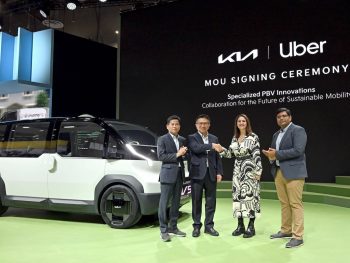Kia to supply new modular electric vehicles to Uber
Kia has struck a deal to offer its new modular electric vehicles to Uber drivers, hot on the heels of the debut of the new PBVs.

The partnership will seek to produce Kia PBVs optimised for ride-hailing drivers as part of Kia’s ‘Platform Beyond Vehicle’ strategy
The partnership will seek to produce Kia PBVs optimised for ride-hailing drivers as part of Kia’s ‘Platform Beyond Vehicle’ strategy in this field of the mobility market.
Revealed this week at the CES event in Las Vegas, the brand’s PBVs provide “a total mobility solution that combine fit-for-purpose EVs with advanced software solutions”.
The dedicated PBV model line-up includes the entry PV1, the midsize PV5 and the larger PV7, with other models expected to sit in-between.
First to arrive will be the PV5, revealed in concept form at CES and due to enter mass production in 2025, followed by bespoke high roof, van, chassis cab, robotaxi and pickup variants. It’s designed for operations such as ride-hailing, delivery and utilities and will provide conversion capabilities for diverse customer needs.
Uber’s PV5 fleet will feature further optimisations tailored for the ride0hailing market. The new vehicles will provide Uber with advanced mobility capabilities while supporting the ride-hailing giant in achieving its 2040 zero-emission goal. From Kia’s perspective, the deal will help identify optimal specifications for PBV models, with the possible further integration of technology and services to benefit drivers and ride-hailing users alike.
“PBVs will play a key role in the customisation of mobility, and by partnering with Uber, Kia aims to deliver industry-leading technology with advanced software and services to enhance the ride-hailing experience,” said SeungKyu (Sean) Yoon, president & CEO, Kia North America, and Kia America.
“Drivers on the Uber platform will also have the ability to choose Kia vehicles with a comprehensive suite of offerings that will ease the ramp up of electrification and help achieve both Kia’s and Uber’s sustainability goals.”
Kia will roll out its PBVs in a three-phase plan that aims to see PBVs transform the mobility landscape over the next decade, backed by new services too.
In the case of Uber, its holistic approach includes “optimised operational solutions” that could offer new driver and passenger experiences, building connected car experiences. Personalised riding environments, including climate and sound control, and interactive rear-seat entertainment systems, may also follow.
Kia and Uber will also collaborate on ways to moderate total cost of vehicle ownership by analysing the various PBV options and potential Battery as a Service (BaaS) subscription offerings to reduce initial vehicle purchase costs.
“Drivers on the Uber platform are already EV early adopters, going electric six to seven times faster than the general population in the US and Europe,” said Susan Anderson, vice president, global head of business development. “That’s great for all of us because when rideshare drivers go electric, communities see three to four times the emissions benefits compared with an average driver making the switch.
“By teaming up with Kia and providing our insights, we aim to broaden the appeal and lower the cost of electric vehicles, making them a more natural choice for more drivers.”
Further details of Kia’s PBV strategy and implementation in the UK will be revealed in due course.

